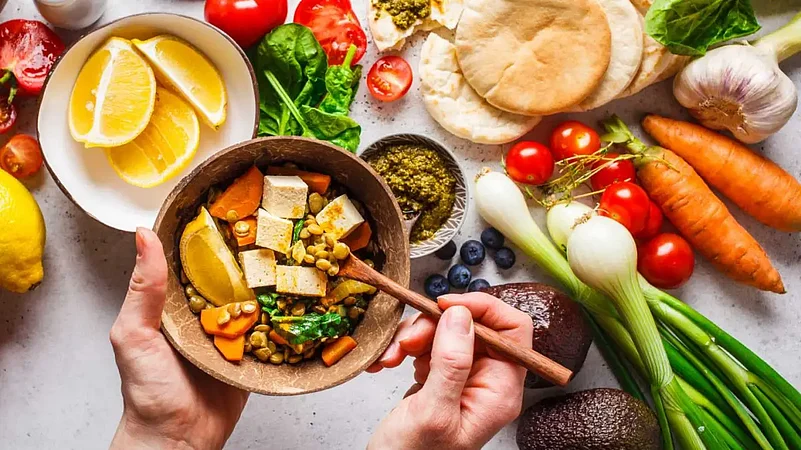A vegan is someone who excludes all kinds of animal products from their life. While the word vegan was coined in 1944 to just mean ‘non-dairy vegetarians’, the definition was widened in 1951 to exclude the consumption of all animal products. In recent times, there has been a spike in the number of very proud and very vocal vegans across the globe and India is no exception. From diverse health benefits to mitigating global warming, veganism’s perceived benefits appear to be endless but is it all good?
Vegetarianism gives way to veganism
The past few years have seen more and more people turn to veganism for a variety of reasons like longevity, weight loss, health consciousness, and more recently, in the wake of Covid-19, as a way to distance themselves from zoonotic diseases. Many expert nutritionists such as Harvard-affiliated Kathy McManus, believe while there are some reported benefits of a vegan diet such as lower blood pressure and body mass index, reduced risk for diabetes, heart disease and cancer, one must also be aware of the potential drawbacks.
What to watch out for?
Vegan diets may be rich in nutrients such as folic acid, fibre, vitamin C, E, potassium and magnesium but eliminating all animal products from one’s diet may leave one vulnerable to a host of micronutrient deficiencies, some of which, are irreversible.
Iron deficiency
There are two types of iron sources that can be consumed by humans: heme and non-heme. While heme iron is found in animal sources, non-heme iron is found in plant sources. For vegans, the risk of iron deficiency and therefore, medical conditions like anaemia, increases because heme iron, which is not a part of their diet, is more easily absorbed by the body than non-heme iron.
Therefore, vegans must ensure that they include enough food products with non-heme iron such as soybeans, legumes, quinoa, oatmeal, wholewheat bread, cereal, lentils, and cooked spinach. In addition, they must also try to include some of the food items that help aid the absorption of iron in the body, such as, foods with high levels of vitamin C.
B12 deficiency: irreversible damage
According to experts, the human body needs about 1.5 micrograms of B12 every day. Vitamin B12 is found in ample amounts in meat, fish, dairy and eggs but is absent in fruits vegetables and grains. A B12 deficiency may cause irreversible neurological issues as the symptoms caused by this deficiency appear only after three to four years. Therefore, vegans must include either fortified foods or cereals or take supplements to make up for the absence of B12 in their diet.
Possible protein deficiency
Protein is the building block of all life. Its deficiency may lead to fatigue, weakness, hair loss, dry skin, and brittle nails. While vegans must be more particular about including protein in their diet as compared to meat and dairy eaters, the good news is that there a plenty of plant foods that are potent protein sources such as legumes, soy foods, nuts, flax and chia seeds so on and so forth.
It’s true that a vegan lifestyle requires more discipline and it may not be a sustainable path for many people. However, for those who do decide to be more conscientious about their eating habits and can afford to do so, there’s no dearth of measures to ensure that all their nutrient needs are taken care of despite having said adieu to the animal foods.


















.png?w=200&auto=format%2Ccompress&fit=max)







